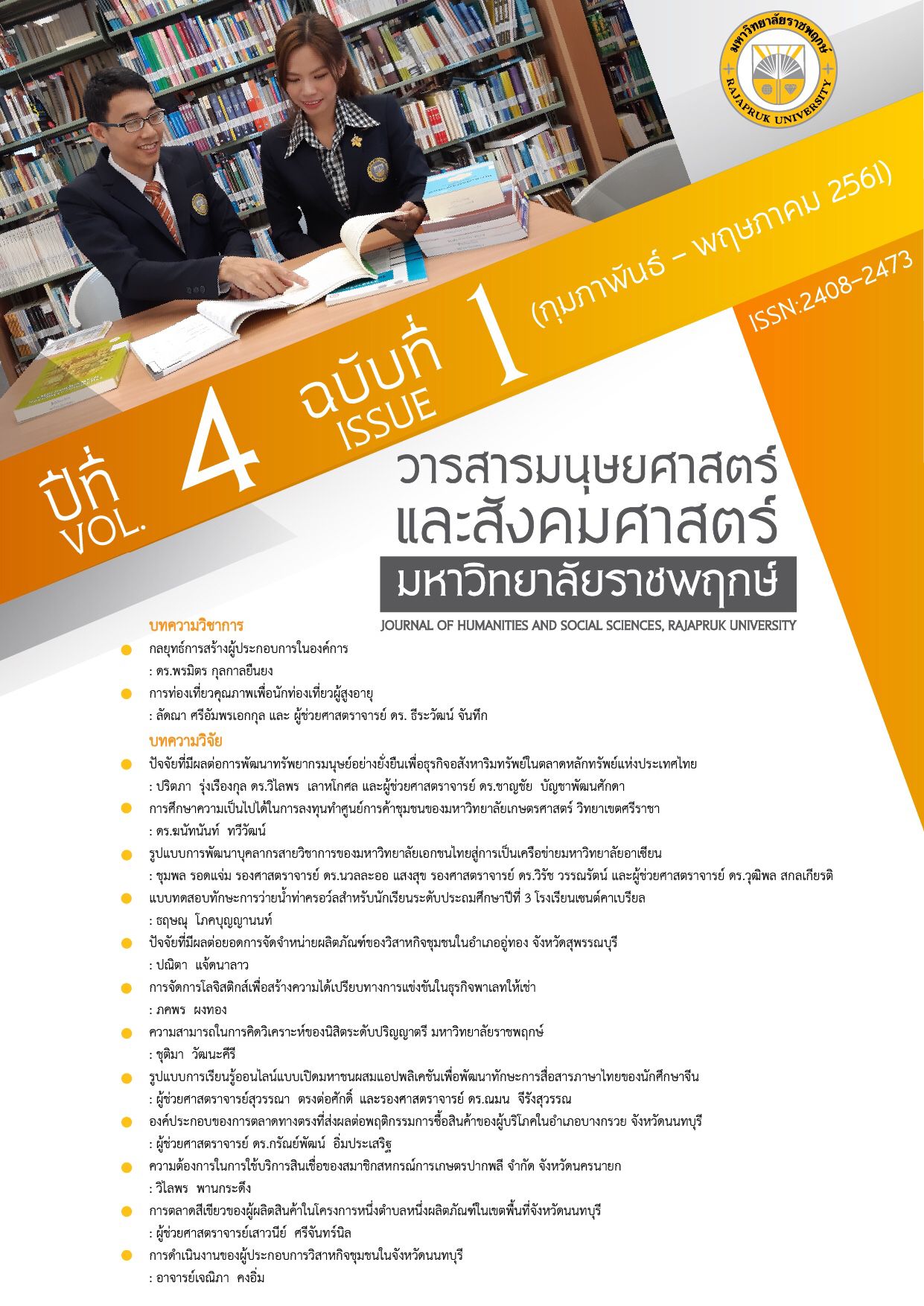Factors Affecting Sustainable Human Resource Development for Real Estate Companies Listed in the Stock Exchange of Thailand
Main Article Content
Abstract
The purpose of this research was to study factors affecting to Human Resource Development for Real Estate Companies listed in The Stock Exchange of Thailand. The questionnaire was collected 450 employees from both supervisor and operational staff level. The random sampling was purposive bases. Data analysis was based on descriptive statistics; One-way ANOVA and Multiple Regression Analysis. The hypothesis was statistically significant at .05 level with qualitative research. As for in-depth interview, it found that most respondents were female, aged 31 - 35 years old, single, hold bachelor's degree, operational staff positions who had experienced 7 - 9 years. From the research result found that more than 9 years' experienced staff with income between 15,000 - 20,000 Bath were related to organizational management; strategy/policy, concept, vision, leader condition, and measure or system on the Human Resource Management. Additionally, the internal relationship contract characteristics to Human Resource Development. It stated that the relationship between external factor and Human Resource Development was statistically significant at .05. From interviewing to real estate development business expert, the administrative emphasized on policy and strategies to meet the expectations of employees. The trend policy of the industrial market, governmental policy had to be adjusted all the times.
Article Details
References
คติยา อายุยืน. (2559). การพัฒนาทรัพยากรมนุษย์ด้วยหลักพุทธธรรมเพื่อการพัฒนาองค์การที่ยั่งยืน. สถาบันพัฒนาฝีมือแรงงานภาค 11 สุราษฎร์ธานี.
จีรภัคร อเนกวิถี และคณะ. (2559). ความสัมพันธ์ระหว่างแรงจูงใจกับความจงรักภักดีต่อองค์การของพนักงาน: กรณีศึกษา โรงแรมเอเชีย แอร์พอร์ท. วารสารมนุษยศาสตร์และสังคมศาสตร์ มหาวิทยาลัยราชพฤกษ์. 1(3): 48 - 58. ค้นเมื่อ 20 เมษายน 2561, จาก https://www.tci-thaijo.org/index.php/rpu/issue/view/9565
วรรณภา ลือกิตินันท์. (2558). การประยุกต์ใช้แนวคิดสมรรถนะในการจัดการทรัพยากรมนุษย์: กรณีศึกษา บริษัทผลิตยางรถยนต์ชั้นนำระดับโลกแห่งหนึ่ง. วารสารวิทยาการจัดการ, 32(1): 19 - 36.
สกลธ์ ขุนสนิท. (2556). รูปแบบการบริหารงานบุคคลในสถานศึกษาขั้นพื้นฐานที่เป็นนิติบุคคลตามนโยบายการกระจาย อำนาจในจังหวัดชายแดนด้านตะวันออก. วิทยานิพนธ์ระดับดุษฎีบัณฑิต มหาวิทยาลัยอีสเทิร์นเอเชีย.
สมจินตนา คุ้มภัย. (2553). การเปรียบเทียบวัฒนธรรมองค์การที่มีอิทธิพลต่อประสิทธิผลองค์การ:กรณีศึกษารัฐวิสาหกิจในประเทศไทย. หลักสูตรรัฐประศาสนศาสตรดุษฎีบัณฑิต
คณะรัฐประศาสนศาสตร์ สถาบันบัณฑิตพัฒนบริหารศาสตร์.
Anekwithee, J. et al. (2016). The Relationship between Motivation and Organizational Loyalty: A Case Study of Asia Airport Hotel. Journal of Humanities and Social Science, Rajapruk University. 1(3): 48 – 58. Retrieved April 20, 2018 https://www.tci-thaijo.org/index.php/rpu/issue/view/9565 (in Thai)
Ayuyeun, K. (2016). Human Resource Development with Buddhadhamma For Sustainable Development of Organization. Surat – Thaini Institute For Skill Development 11.
Charoenwongsak, K. (2013). The momentum of labor to real estate Thailand. Retrieved June 6, 2016 www.bangkokbiznews.com/blog/detail/501571 (in Thai)
Khunsanit, S. (2013). A Personnel Administration Model for the Juristic Basic Education Institute under the Decentralization Policy in The Bordered Provinces of Eastern Thailand. Doctoral Dessertation Easternasia University. (in Thai)
Koompai, S. (2010). Comparison Among Organizational Cultures Affecting Organizational Effectiveness: A Case Study of Thailand’s Public Enterprises. Doctor of Public Administration, National Institute of Development Administration.
Leakittinun, W. (2015). The Competency Implementation in Human ResourceManagement: A Case Study in Global Leading Tire Company. Journal of Management Sciences, 32(1): 19 - 36. (in Thai)
W.G.cochran. (1963). Sampling Techniques. XVII + 413 S. New York: London.


